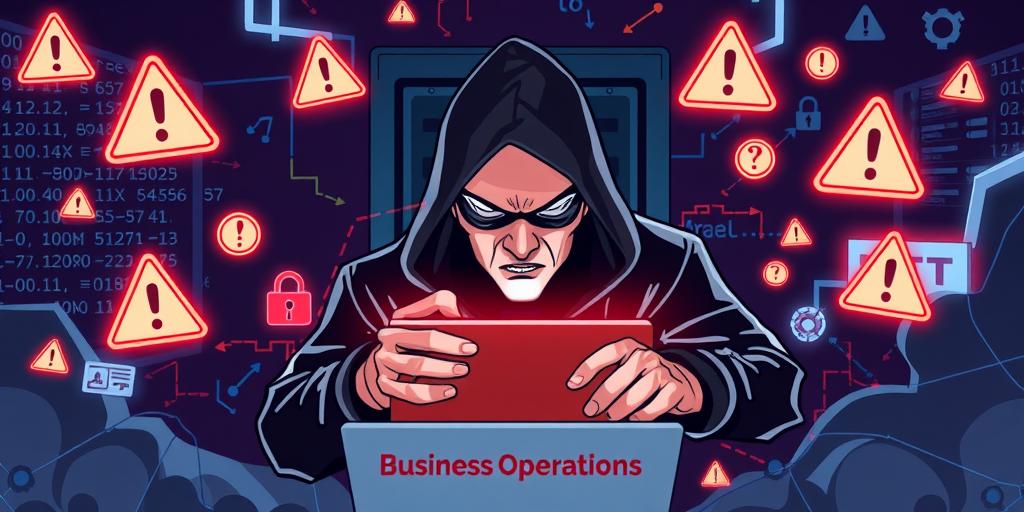In today’s digital landscape, businesses of all sizes are increasingly vulnerable to cyber attacks. These attacks can have a devastating impact on operations, leading to financial losses, reputational damage, and operational disruptions. Understanding the various types of cyber attacks and their consequences is crucial for businesses to effectively mitigate risks and protect their assets.
The Impact of Cyber Attacks on Business Operations: An Analytical Review
Introduction
The Growing Threat of Cyber Attacks
The threat of cyber attacks is constantly evolving, with attackers becoming more sophisticated and finding new ways to exploit vulnerabilities. The rise of remote work and the increasing reliance on cloud-based services have further expanded the attack surface, making it easier for attackers to gain access to sensitive data.
The Importance of Understanding the Impact
Understanding the potential impact of cyber attacks is essential for businesses to prioritize cybersecurity and implement appropriate safeguards. By recognizing the consequences of a successful attack, organizations can make informed decisions about their security investments and develop comprehensive strategies to protect their assets.
Types of Cyber Attacks and Their Impact
Malware Attacks
Ransomware
Ransomware attacks are a major concern for businesses, as they can encrypt critical data and hold it hostage until a ransom is paid. The impact can be significant, disrupting operations, causing financial losses, and potentially damaging the company’s reputation.
Viruses and Worms
Viruses and worms are malicious programs that can spread through networks, infecting devices and compromising data. They can cause system crashes, steal sensitive information, and disrupt business operations.
Data Breaches
Data Theft
Data breaches can result in the theft of sensitive information such as customer data, financial records, and intellectual property. This can lead to significant financial losses, reputational damage, and legal consequences.
Identity Theft
Data breaches can also lead to identity theft, where attackers use stolen information to impersonate individuals and commit fraud. This can have a devastating impact on individuals and businesses, leading to financial losses, credit damage, and reputational harm.
Denial-of-Service Attacks
Disruption of Business Operations
Denial-of-service (DoS) attacks overload a target system with traffic, making it inaccessible to legitimate users. This can disrupt business operations, leading to lost revenue and customer dissatisfaction.
Financial Losses
DoS attacks can also result in financial losses, as businesses may lose revenue due to downtime and the cost of recovering from the attack.
Social Engineering Attacks
Phishing
Phishing attacks involve tricking users into revealing sensitive information by sending fraudulent emails or messages that appear to come from legitimate sources.
Pretexting
Pretexting attacks involve attackers using deception and manipulation to gain access to sensitive information. They may impersonate trusted individuals or organizations to trick victims into providing personal details or granting access to systems.
The Impact on Business Operations
Financial Losses
Direct Costs
Direct costs associated with cyber attacks include expenses for incident response, data recovery, legal fees, and ransom payments. These costs can be significant, especially for large-scale attacks.
Indirect Costs
Indirect costs can include lost revenue, damage to reputation, and decreased productivity. These costs can be difficult to quantify but can have a significant impact on the business’s long-term profitability.
Reputational Damage
Loss of Customer Trust
Data breaches and other cyber attacks can erode customer trust, leading to a decline in sales and customer loyalty.
Negative Media Coverage
Negative media coverage of cyber attacks can further damage the company’s reputation and make it more difficult to attract new customers or investors.
Operational Disruptions
System Downtime
Cyber attacks can cause system downtime, disrupting business operations and impacting productivity.
Data Loss
Data loss is a major consequence of cyber attacks, as attackers may delete or encrypt critical data. This can lead to significant financial losses and operational disruptions.
Legal and Regulatory Compliance Issues
Data Protection Regulations
Businesses must comply with data protection regulations such as the General Data Protection Regulation (GDPR) and the California Consumer Privacy Act (CCPA). Failure to comply with these regulations can result in significant fines and legal action.
Cybersecurity Standards
Businesses are also expected to adhere to cybersecurity standards such as the National Institute of Standards and Technology (NIST) Cybersecurity Framework.
Mitigating the Impact of Cyber Attacks
Implementing Strong Cybersecurity Measures
Network Security
Businesses should implement strong network security measures such as firewalls, intrusion detection systems, and intrusion prevention systems to protect their networks from unauthorized access.
Endpoint Security
Endpoint security measures are essential for protecting individual devices such as computers, laptops, and mobile phones. This includes using antivirus software, anti-malware solutions, and encryption to protect sensitive data.
Data Security
Data security measures are critical for protecting sensitive information. Businesses should implement strong access controls, data encryption, and data loss prevention solutions to protect data from unauthorized access and theft.
Developing a Comprehensive Incident Response Plan
Detection and Containment
A comprehensive incident response plan should outline steps for detecting and containing cyber attacks. This includes establishing monitoring systems, identifying potential threats, and isolating compromised systems.
Recovery and Mitigation
The plan should also include strategies for recovering from attacks, restoring systems and data, and mitigating the impact of the attack.
Employee Training and Awareness
Cybersecurity Best Practices
Employees should be trained on cybersecurity best practices, including password security, secure browsing habits, and how to identify phishing attacks.
Phishing Awareness
Phishing awareness training is essential to educate employees about the risks of phishing attacks and how to recognize and avoid them.
The Importance of Proactive Cybersecurity
Proactive cybersecurity measures are crucial for mitigating the impact of cyber attacks. Businesses should invest in robust security solutions, implement strong security policies, and train employees on cybersecurity best practices.
The Future of Cyber Attacks
The threat of cyber attacks is only expected to increase in the future, as attackers become more sophisticated and find new ways to exploit vulnerabilities. Businesses must stay vigilant and adapt their cybersecurity strategies to meet these emerging threats.
Businesses need to take a proactive approach to cybersecurity and implement comprehensive measures to protect their assets. By understanding the various types of cyber attacks, their potential impact, and effective mitigation strategies, organizations can significantly reduce their risk and protect their businesses from the devastating consequences of a successful attack.




